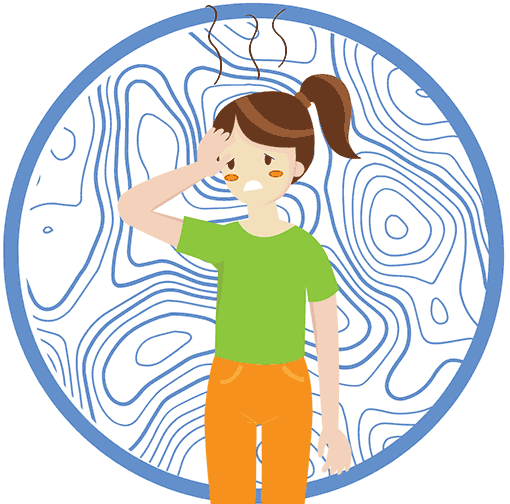How Does The Limbic System Function?
The limbic system is the part of the brain involved in our behavioral and emotional response. Often referred to as our animal brain, the limbic system is dramatically affected by illness. It responds to illness like a smoke alarm responds to smoke or fire. It activates and stays activated until we are well again.
In the case of chronic illness or disease, your limbic system could be turned on for months or even years at a time. And because the limbic system suffers so much during chronic illness, it needs extra attention during recovery.
At Boulder Holistic Functional Medicine in Boulder, CO, we’ve seen the negative consequences of an overactive limbic system. Part of our treatment for chronic illness usually involves limbic retraining – strategies to calm the limbic system and turn off the alarm.
Keep reading to learn more about limbic retraining, including why you should take care of your limbic system when healing from chronic illness and a few life changes to retrain your brain.
The Limbic System Reaction to Chronic Illness

We often hear stories about people whose limbic systems are overactive due to chronic illness without knowing that is the cause.
People with overactive limbic systems might struggle to go out without a mask and hand sanitizer. They may not feel comfortable going to new places, avoid going outside to avoid tick bites, or stay bedridden for years with a chronic illness.
The people who have yet to leave their houses since the COVID shutdown or who smell mold in every building that they enter most likely are struggling with an overactive limbic system.
Most people might hear these stories and think that the problem is all in their heads. And while that is partially true (your brain is inside your head after all) the real culprit is physiological, not psychological.
Where is the limbic system located? Your limbic system wraps around the brain stem and contains several essential cerebral structures including the amygdala, hippocampus, and other structures that are located within the brain’s temporal and frontal lobes.
The amygdala is the “fight or flight” part of the brain responsible for hunger, arousal, and emotional responses. When you are ill, the amygdala becomes hypervigilant. Chronic fatigue syndrome, biotoxin illness , Lyme disease, and other chronic illnesses turn on fight-or-flight. Your body sees the infection as an enemy and reacts to protect you from the perceived danger.
You become emotionally wired to react to certain triggers related to your illness. You might panic in large crowds, cringe when hiking in wooded areas, or flinch at the smell of mold.
The triggers activate a vicious cycle in the limbic system. One whiff of mold and you start to experience symptoms of biotoxin illness – muscle aches, joint pain, headaches, brain fog, anxiety, depression, gut problems, or insomnia. In this example, these symptoms are often seen as limbic systems disorders, rather than a byproduct of an overactive limbic system.
This reaction will remind you of your illness and make you feel sicker. The limbic system keeps you from healing because it keeps you in a constant state of fear about your illness. Limbic system retraining focuses on healing the amygdala using therapeutic techniques to alter the way the limbic system processes and responds to stressful stimuli.
What is Limbic “Retraining”?
Commonly referred to as “Limbic System Therapy”, limbic retraining relies on the concept of neuroplasticity – or the idea that we can change our brains. Using limbic retraining techniques, we can “rewire” the way that the brain processes stressful stimuli.
If you are frozen in fight or flight, the symptoms you feel in response to your triggers are not made up. They are a very real reaction to the trauma of illness. Simply put – you are not crazy, you are simply caught in the limbic system feedback loop.
The structure, functions, and connections made in the brain in response to an illness don’t have to be permanent. Limbic retraining interrupts the cycle of symptoms and illness to help you heal.
Is it Possible to Have a “Damaged Limbic System”?
The reality is, some people are genetically predisposed to a hyperactive limbic system. Others may experience disease, illness, or trauma that activates it. In both cases, the limbic system turns on and stays on.
Imagine the smoke alarm going off in your house all day while your dog is home alone. They cannot escape the never-ending drone of the alarm and, when you return from work in the evening, your pup will most likely be stressed, shaking, and hiding in a corner.
The same is true for people with hyperactive limbic systems. They cannot focus on getting better because they are in a constant state of fight-or-flight. Their quality of life suffers and they may end up on disability, bedridden, or chronically ill.

What are common symptoms of a hyperactive limbic system?
- “Long” COVID
- Chronic Lyme disease
- Biotoxin illness
- Mast Cell Activation Syndrome (MCAS)
- Anxiety
- Sleep issues
- Irritable Bowel Syndrome (IBS)
- Myalgic Encephalomyelitis / Chronic Fatigue Syndrome (ME/CFS)
A hyperactive limbic system also strains the immune system. The overactive amygdala signals the release of cortisol which suppresses immune activity. Over time, you may become immunocompromised and thus more likely to develop other diseases or illnesses.
How to Change Your Life to Support the Limbic System

At Boulder Holistic Functional Medicine in Boulder, Colorado, limbic retraining is an essential part of healing with functional medicine.
We are often asked for limbic system retraining exercises. We first suggest our patients consider the following lifestyle measures to help support optimum brain health:
- Eating an anti-inflammatory diet including high-quality Omega 3s oils and curcumin (the active ingredient in turmeric)
- Yoga
- Meditation
- Mindfulness
- A regular gratitude practice
- Prioritizing sleep
- Managing stress through breath work techniques like boxed breathing or the Wim Hoff method
- Using manual tapping techniques like EFT (Emotional Freedom Technique) to soothe the limbic system
- Addressing chronic infections and environmental exposures like mold exposure with our qualified healthcare providers.
There are also several programs that may be used in limbic system retraining, including:
- Neurofeedback through a certified provider or using home units such as
The limbic response to illness is natural and necessary but staying in a constant state of fight-or-flight is not. Limbic retraining helps turn off the limbic system alarm bells so that you can get on with what is important – healing from your illness and living your life.
Retrain Your Limbic System With Boulder Holistic
Limbic retraining is crucial for anyone recovering from chronic illness – including those with biotoxin illness. The experienced functional medicine doctors at Boulder Holistic Functional Medicine in Boulder, CO, have many strategies to help you turn off the limbic system alarms and move you further down the road to recovery.
Learn more about limbic retraining and the benefits of functional medicine by scheduling an initial consultation today.

Email Us
Have a question? Need to schedule an appointment? Send us an email. We'll get back to you right away.

Get Directions
2355 Canyon Blvd
Suite 102
Boulder, CO 80302

Call Us
Need an appointment, prescription refill or have questions? Call us from 9:30am to 4:00pm.
303-390-1245









